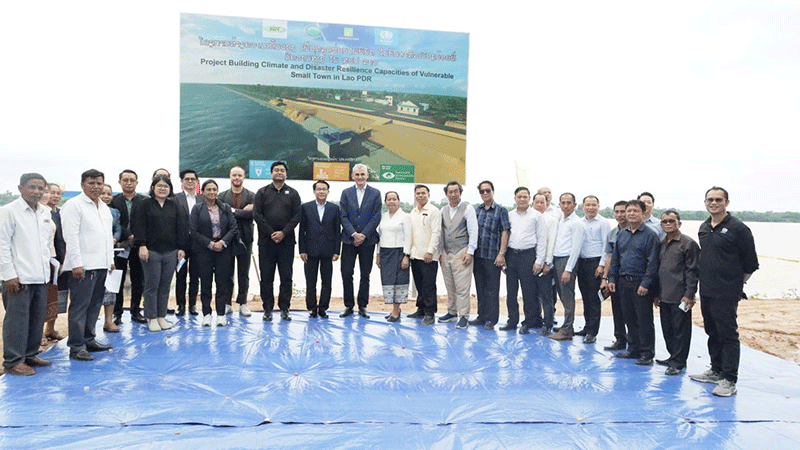 |
| National, provincial and district stakeholders with the authors during a Voluntary Local Review sensitisation workshop in Savannakhet province. |
Smart cities, resilient people: Localising the SDGs for inclusive urban futures in Laos
By Mr Bakhodir Burkhanov, UN Resident Coordinator, UN Lao PDRDr Avi Sarkar, Regional Advisor South-East Asia, UBS, GSD
and Head of Office Lao PDR, UN-Habitat
As we celebrate Urban October, a month dedicated to raising awareness of the challenges and opportunities facing urban areas around the world, it’s the perfect time to imagine a future where technology not only powers infrastructure but transforms lives.
A place where a child in a remote neighbourhood has the same access to education and clean water as one living in the heart of the capital Vientiane. This is not a distant vision but the promise of smart, inclusive cities—where every decision, every piece of infrastructure, and every technological innovation is designed with people at the centre.
In Laos, where the urbanisation rate is currently 4.9 percent and nearly half of the population is expected to live in urban areas within a decade, the key to success lies in ensuring that this rapid growth benefits everyone, leaving no one behind.
Smart Cities: Putting People at the Core
While the concept of smart cities is often linked to cutting-edge technology, at its heart, it’s about making urban life better for people. Whether through more efficient public services, enhanced mobility, or safer streets, smart cities leverage innovation to create more livable, sustainable environments. This means taking a people-first approach to urban development, where technology is not an end but a tool for improving the lives of all citizens, particularly the most vulnerable. Currently, UN agencies like ESCAP and UN-Habitat are working closely with the Ministry of Public Works and Transport to help develop the National Smart Cities Strategy.
Localising the SDGs: A Blueprint for Inclusive Growth
In Laos, localising the Sustainable Development Goals (SDGs) is crucial for fostering inclusive, sustainable urban transformation. The SDGs offer a framework for addressing critical urban challenges, from ensuring clean water access (SDG 6) and affordable housing (SDG 11) to creating opportunities for decent work and economic growth (SDG 8).
By embedding these goals into the smart city strategies, we can move beyond mere infrastructure development and focus on creating opportunities for all citizens to thrive. The country made significant progress by hosting its first sensitisation meeting on Voluntary Local Review last July in Kaysone city. Key stakeholders from both local and national levels convened to discuss and plan the way forward.
Empowering Communities for Resilience
True resilience is not just about a city’s ability to withstand shocks but about how it empowers its people to adapt and thrive. Across Laos, local communities have played an important role in adapting and building resilience, particularly in response to climate challenges. From flood management initiatives to sustainable urban planning, community-driven projects are giving hope that cities become more adaptable when the people themselves are engaged in shaping their environment.
Smart cities must embrace this spirit of community empowerment. By fostering partnerships between local governments, civil society, and residents, we can ensure that Laos’ cities are not just efficient but resilient - able to meet the challenges of the future.
Youth and Gender: Driving the Future of Urban Laos
The future of Laos’ cities lies with its youth - approximately 60 percent of the population is under the age of 25, and the median age is around 24. As digital natives, young people are poised to drive the innovations that will shape the country’s urban spaces. However, to build truly inclusive smart cities, we must place gender equality and social inclusion at the forefront of our efforts. Women and marginalised groups often face disproportionate barriers in urban environments, from unsafe public spaces to limited access to economic opportunities.
By prioritising gender-sensitive urban planning and creating spaces where all people feel safe and empowered, Laos can ensure its smart cities are places where everyone regardless of gender, background, or economic status can succeed.
Public-Private Partnerships: Unlocking Innovation for the Public Good
The success of smart cities depends on strong partnerships. Public-private partnerships (PPPs) are key to unlocking the resources and expertise needed to drive innovation. However, these partnerships must be structured to serve the public good. Whether it’s enhancing road safety, expanding access to affordable housing, or building sustainable infrastructure, PPPs in Laos must focus on delivering tangible benefits to citizens, ensuring that private investment supports public well-being.
A Collective Responsibility
The journey to building smart, inclusive cities in Laos cannot be undertaken by any one sector alone. It requires collaboration from local governments, communities, the private sector, and development partners like the United Nations. Together, we can create urban environments that are not only technologically advanced but also equitable, safe, and sustainable for all.
As Urban October reminds us, the cities of tomorrow are shaped by the decisions we make today. By putting people at the centre of urban development and localising the SDGs, Laos can build cities that work for everyone - smart, resilient, and inclusive for generations to come.
ByOP-ED
(Latest Update October 9, 2024)
|


